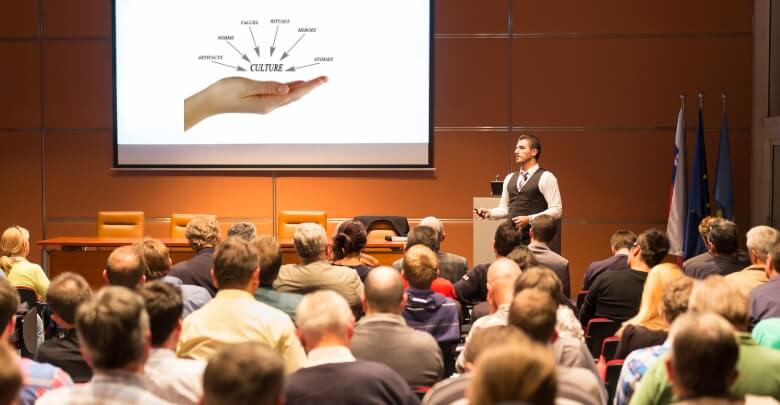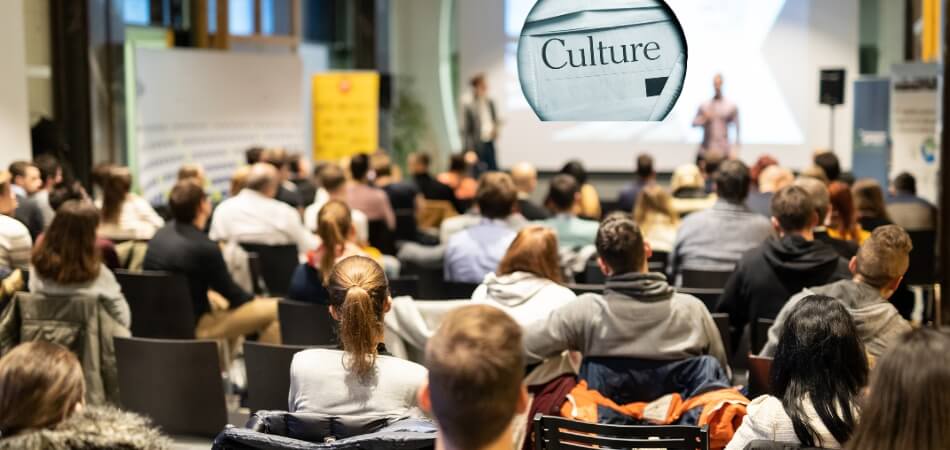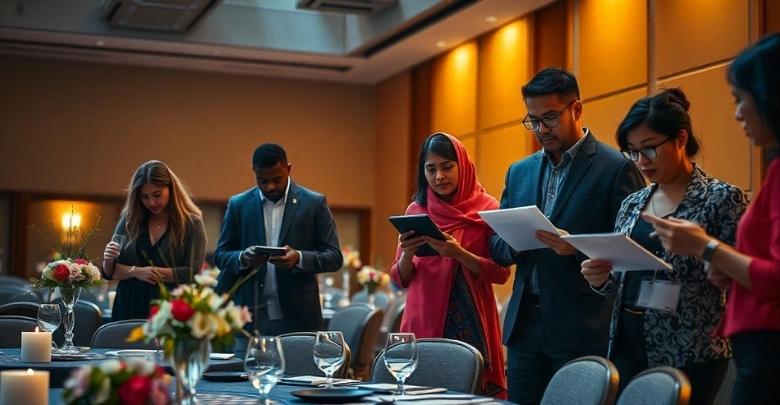Collaboration and networking are crucial for growth and innovation in an interconnected world, especially in a dynamic environment like conferences. Among various types of events, cultural conferences stand out by focusing on the rich variety of human expression and social norms. But, what is a culture conference?
A culture conference is an engaging event where participants and experts come together to share insights into various cultural dimensions like art, music, and societal values. The conferences are an excellent platform for cultural education and awareness, encouraging networking among diverse groups and featuring thoughtful speakers, interactive panels, and practical workshops.
Curious to know more about this? Join us as we go deeper into culture conferences’ significance and impact in our detailed article.
Are Conferences Influencing Cultures?
Yes, conferences have a significant influence on cultures. They provide an excellent platform where people from various backgrounds share cultural insights. This exchange promotes a deeper knowledge and appreciation of various cultural environments.
Events like these encourage dialogue among cultures, which leads to more inclusive communities. Participants from diverse locations with different values and traditions attend a culture conference to know and spread cultural ethics and practices. They offer opportunities for participants to learn about different cultural practices and viewpoints. Such interactions can challenge stereotypes and promote global unity.
Conferences also encourage collaboration and innovation among cultures. By bringing together creative minds they generate new ideas that influence cultural expressions. These events often result in lasting partnerships that cross geographical and cultural boundaries.
What Is a Culture Conference?
A culture conference is an event where people explore various aspects of culture such as the arts, traditions, and societal norms. It is designed to gather thinkers, artists, and academics who discuss cultural dynamics and impacts. These events are essential for anyone keen to learn about cultural diversity and its role in shaping societies.
These conferences provide an opportunity for discussions cultural exchange and education. Participants leave with a better knowledge of how cultures influence one another. Such gatherings also highlight the importance of preserving cultural heritage while incorporating modern influences.
Many enthusiasts join culture conferences from overseas, drawn by the opportunity to network and share cross-cultural experiences. With this global participation, the conference offers a wider perspective on cultural issues. Taking part in an event like this can profoundly increase your cultural knowledge and connections.
What Will You Find at A Culture Conference?
An experience like attending a culture conference can be eye-opening, allowing one to see how global cultures interact. People who are passionate about learning and exchanging cultures gather at these events. There are numerous reasons to join a cultural conference besides sharing cultural practices and occasions. Here’s what you can expect when you attend one.
- Diverse Participants: The participants come from diverse backgrounds, bringing a rich tapestry of experiences and perspectives. This diversity adds to discussions and expands cultural awareness.
- Expert Speakers: Renowned experts and academics discuss cultural trends, history, and impacts. Their insights provide depth and context to cultural narratives.
- Interactive Workshops: Workshops allow hands-on experiences in the arts and cultural crafts. Participants engage actively, learning new skills and expressions.
- Panel Discussions: Panels discuss current cultural topics and feature diverse viewpoints. These sessions encourage lively discussions and build communication among attendees.
- Cultural Exhibitions: Artifacts and art displays showcase cultural heritage from around the world. These exhibitions visually communicate the beauty and uniqueness of different cultures.
- Networking Opportunities: Attendees connect with peers, experts, and activists. Culture is enriched by networking, which leads to collaboration and future projects.
- Cultural Performances: Traditional dances and musical performances highlight the conference. These performances offer a joyful atmosphere and cultural education.
- Resource Sharing: Materials and publications on cultural topics are available. Attendees access a wealth of information for further learning and exploration.
Who Can Attend a Culture Conference?
The purpose of a cultural conference is to create a melting pot of ideas and expressions among people from all walks of life. This event attracts a wide range of crowds, each bringing their unique perspectives and experiences. Here we explore who might show up at a gathering like this:
Academics and Scholars
University professors and researchers enjoy their time at these conferences. They present papers, share insights, and seek new data for their studies. Many are looking to collaborate on cross-cultural research projects. Their deep knowledge enriches learning experiences for all.
Artists and Performers
Creatives from the arts like painters, musicians, and dancers often attend. They perform, exhibit their works, and engage in discussions about cultural art forms. These attendees bring creativity to the conference. Their performances and art pieces are major attractions.
Students and Educators
Students from various educational institutions come eager to learn. Educators seek fresh content for their curriculums and teaching methods. Both groups appreciated the hands-on workshops and networking opportunities. They left with broader perspectives and new educational resources.
Cultural Enthusiasts
Individuals passionate about cultural preservation and promotion frequent these events. They aim to discover and spread knowledge about different cultural practices. These individuals are often involved in community projects back home. They gather new ideas and inspiration at the conference.
Business Professionals
Executives and marketers specializing in global markets also attended. They look to grasp cultural nuances to better hone their strategies. Networking is necessary for them to establish international partnerships. These professionals bring a practical viewpoint to the discussions.
Policy Makers and Activists
Government representatives and NGO workers focus on cultural policies and advocacy. They discuss legislation’s impacts on societal practices and communities. Their goal is sustainable and inclusive cultural development. These attendees often lead sessions on cultural rights and preservation.
How to Find a Culture Conference?
Culture conferences are interactive events between participants from different societies, cultures, and customs. Attendees can expect to join conferences themed on various topics. For instance, finding upcoming language literature conferences can be an interesting choice as a part of the culture conferences. Diverse topics and themes make these events more colorful and rich in tradition and ethics. Now, how do you find such a conference? Here are some steps to help you find one.
- Online Conference Directories and Websites: Websites Global Conference Alliance Inc., Eventbrite, and Meetup have extensive listings of conferences across various fields, including culture. You can filter searches by date, location, and specific cultural interests.
- Academic and Professional Organizations: Check websites or newsletters of organizations related to cultural studies, anthropology, sociology, or specific cultural interests.
- Social Media and Networking: Platforms like LinkedIn, Twitter, and Facebook often have event listings and group discussions where upcoming conferences are shared. Following relevant organizations or hashtags like #CultureConference can keep you updated.
- University and Academic Institution Websites: Many universities host conferences on cultural topics. Checking the events pages of universities with strong cultural studies programs can help you find academic conferences.
- Industry Journals and Publications: Sometimes, cultural conferences are advertised in academic journals, industry publications, or newsletters that focus on cultural studies and related fields.
- Google Search and Alerts: A simple Google search with keywords like “culture conference 2024” can yield results. Setting up Google Alerts for these keywords can also notify you when new conferences are announced.
How to Prepare for A Culture Conference?
A culture conference offers a great opportunity to engage with diverse cultural insights and arts. Proper preparation is crucial for making the most of the experience. Here’s a step-by-step process to help you prepare for this enriching event:
Step 1: Research the Agenda
Start by thoroughly reviewing the conference agenda. Identify sessions that align with your interests or professional goals. This helps you manage your time effectively at the conference. Remember, some sessions require prior registration due to limited seats.
Step 2: Know the Audience
Knowing who attends these events can improve your experience. People join a culture conference to network and exchange ideas, so consider how you might engage with other attendees. This knowledge can help you prepare questions or discussion topics in advance.
Step 3: Plan Your Network Strategy
Create a list of speakers and attendees you want to connect with. Check if the conference has an app or online platform for attendees to interact. Planning your networking will ensure you don’t miss opportunities to meet key people.
Step 4: Prepare Your Contributions
If you’re presenting or participating in a panel, prepare your materials well in advance. Practice your speech or presentation several times. Make sure you have backups of your materials in case of technical issues. This preparation will help you deliver your content confidently.
Step 5: Pack Appropriately
Check the event details for any specific dress codes or cultural considerations. Pack business cards and any other networking tools you might need. Also, remember to bring a notebook and pen for taking notes, or a digital device if you prefer typing.
Step 6: Attend the Conference
Make sure to arrive early and attend the opening session. Engaging from the start sets a proactive tone for your entire experience. Use breaks between sessions to interact with other attendees and speakers. This active participation maximizes networking and learning opportunities.
Step 7: Follow Up After the Conference
Organize the contacts and materials you gathered during the conference. Send follow-up emails to your existing connections and mention specific discussions or sessions you enjoyed. Continuing the conversation post-conference can lead to valuable relationships and opportunities.
Frequently Asked Questions About What Is a Culture Conference?
Here are some of the FAQs and their appropriate answers for a clear concept of what is a culture conference:
How Do I Register for A Culture Conference?
Registration processes vary but typically involve filling out an online form on the conference website. Early registration is advisable to secure your spot.
Are Culture Conferences Suitable for All Ages?
Yes, culture conferences cater to a wide range of age groups, from students to professionals to retirees, bringing up intergenerational dialogue and learning.
Can I Present My Research at A Culture Conference?
Yes, many culture conferences welcome presentations from academics, researchers, and students on various cultural topics.
How Can I Propose a Session or Workshop for A Culture Conference?
Most culture conferences have a submission process where you can propose sessions or workshops relevant to the conference theme.
Are There Scholarships Available for Attending Culture Conferences?
Some culture conferences offer scholarships or financial aid to support attendance, particularly for students or individuals from underrepresented backgrounds.
How Can I Stay Updated on Upcoming Culture Conferences?
You can stay informed by subscribing to newsletters, following relevant organizations on social media, and regularly checking conference websites for announcements.
Conclusion
The rich tapestries of human expression are celebrated through cultural conferences. These events bring together individuals from various backgrounds, each wanting to learn and share their unique cultural insights.
Identifying the role of a culture conference in promoting global connections and cultural appreciation is central to figuring out “What is a culture conference?”. These events are hubs for networking, learning, and experiencing different cultures based on direct engagement.
By participating in these conferences, attendees gain a deeper appreciation for cultural diversity and cultural preservation. Such experiences enrich personal knowledge and contribute significantly to professional growth and global cultural awareness.








